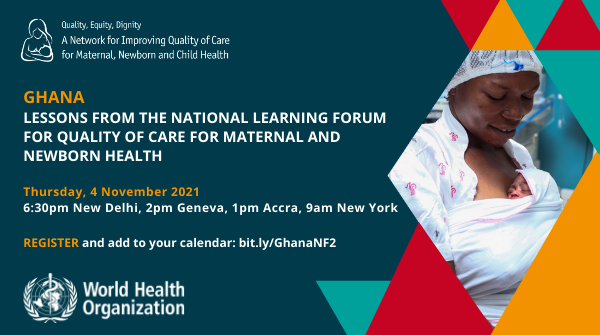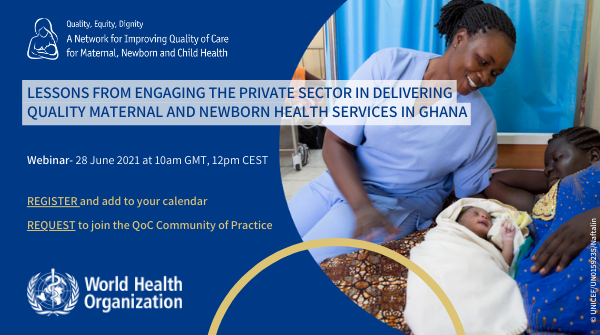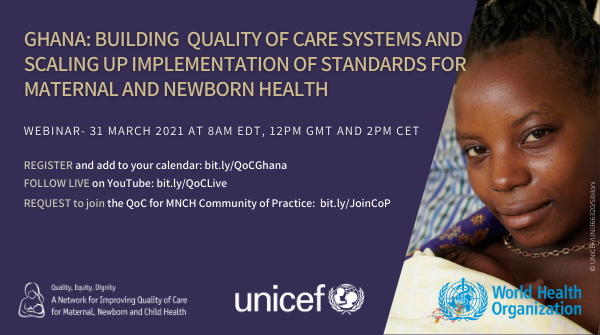Quality of Care in Ghana
Ghana has made consistent gains in implementing the standards for maternal and newborn health, by establishing fundamental leadership systems, providing technical support for action in health institutions, creating platforms for knowledge sharing and strengthening accountability systems.
In December 2016, the Ministry of Health developed the National Healthcare Quality Strategy (NHQS) (2017-2021), which is a policy document that guides the activities of the Quality Management Unit in implementing quality standards in Ghana’s health systems. This strategic policy document guides the implementation of quality and safety within the health sector, and guides the roles of agencies in the operationalization of quality initiatives in Ghana. The NHQS as an overarching national quality document prioritizes Maternal, Newborn and Child Health (MNCH) activities as a pathfinder to the implementation of quality of health services. In 2020, the Ghana Health Service launched the National Healthcare Quality Strategy Implementation Guidelines. This document provides the direction for operationalizing quality improvement systems and activities in Ghana, in-line with the policy directives of the NHQS. Throughout 2021, progress towards the National Health Quality Strategy (2017-2021) has been reviewed with the support of stakeholders towards the development of the next iteration of the Strategy.
Alongside the Strategy is the Integrated Reproductive, Maternal, Newborn, Child, Adolescent Health and Nutrition (RMNCAHN) Strategic Plan (2020-2025). This aims to ensure increased and equitable access to high quality RMNCAHN services for all by 2030 and addresses the critical need for integration of the strategic areas from pre-pregnancy, pregnancy, birth, immediate post-natal for both mothers and newborns, childhood and adolescence.
A Roadmap for Quality of Care for Maternal and Newborn Health (2018-2022) has been successfully implemented across 8 regions by the Ghana Health Services. Ghana adapted the maternal and newborn health quality care standards in 2017. In 2021, the pediatric standards were adopted and the expansion to include the small and sick newborns standards is now ready for implementation in 2022. Implementation packages have been successfully developed with prominence to the community engagement component.
Over the past years, Ghana has established functioning district learning networks and have recently developed mechanisms to share best practices across regions and districts by organizing regional monthly calls. A core activity planned for 2022 is to establish Regional Centers of Excellence in Regional Hospitals to model Quality Improvement implementation.
In 2020, Ghana established a mechanism for the systematic integration of community participation and accountability for quality care. Using a sector-wide strategy based on the development and roll out of a Community Scorecard, is providing a platform for the incorporation of community participation in the identification of needs and solutions to address service gaps and challenges. During 2021, this initiative was scaled up to approximately 3000 primary health facilities with the establishment of functional Community Health Management Committees and training of 3700 community members. To sustain gains and ensure scalability of QoC interventions, in 2022, two national strategies related to community engagement and mobilization are planned; 1. updating the National Strategies for Community Engagement, Participation and Social Accountability for MNH quality of care with a focus on gender dimensions for accessing quality care, and 2. reviewing the National Newborn and Child Health Communication and Advocacy Strategy (2015-2019) and developing a revised strategy to include social accountability, and a work plan to 2025.
Between 2020-2021, the Ministry of Health and WHO Ghana conducted a situational analysis to explore mechanisms for private health sector engagement to improve maternal and newborn outcomes in Ghana. In February 2021, participants at a multi-stakeholder workshop in Accra validated the situational analysis and developed recommendations for the Ministry of Health to take forward which includes building capacity, developing legislative instruments to support private sector engagement mandates, revising the health insurance tariffs, aligning structures, engaging stakeholders and revitalizing the Private Health Sector Alliance of Ghana.
Strong monitoring and data systems is a priority focus through mainstreaming common MNH indicators in the DHIS2 and through establishing mechanism to collect and report facility-based data on the experience of care and on WASH indicators periodically.
Over the course of the COVID-19 pandemic, implementing teams have developed innovative solutions driven by social media and digital technology to bring together practitioners to share experience and learning. Ghana established WhatsApp groups on quality maternal and newborn care. Mentors host in-person presentations on MNH interventions and QoC data is shared on a weekly basis on WhatsApp group forums.
Photos: Ghana Health Service @Eric Asaana (2021)






